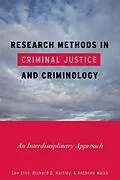Research Methods in Criminal Justice and Criminology is a core text for criminology and criminal justice research methods courses. It strives to offer a general foundation of knowledge that transcends particular topics or subject areas, allowing students to apply research methods and concepts to a multitude of scenarios. Even though the textbook has been written primarily for criminal justice and criminology majors, there is an underlying recognition that research methods and findings are common among all of the social sciences. This text has been designed to be user-friendly, even when dealing with some fairly complex statistical and theoretical concepts. The most critical points are clearly stated and illustrated with examples chosen to be interesting in their own right.
Autorentext
By Lee Ellis; Richard D. Hartley and Anthony Walsh
Zusammenfassung
Research Methods in Criminal Justice and Criminology is a core text for criminology and criminal justice research methods courses. It strives to offer a general foundation of knowledge that transcends particular topics or subject areas, allowing students to apply research methods and concepts to a multitude of scenarios. Even though the textbook has been written primarily for criminal justice and criminology majors, there is an underlying recognition that research methods and findings are common among all of the social sciences. This text has been designed to be user-friendly, even when dealing with some fairly complex statistical and theoretical concepts. The most critical points are clearly stated and illustrated with examples chosen to be interesting in their own right.
Inhalt
Chapter 1 PART I: GETTING STARTED
Chapter 2 Chapter 1 - The Scientific Method and Criminal Justice as a Social Sciences
Chapter 3 Chapter 2 - Formulating Scientific Questions and Locating Background Research
Chapter 4 PART II: THE IMPORTANCE OF STATISTICS
Chapter 5 Chapter 3 - Univariate Statistics and the Concept of Statistical Significance
Chapter 6 Chapter 4 - Bi/Multivariate Statistics: The Concept of Correlation
Chapter 7 PART III: DOCUMENTATION AND MEASUREMENT
Chapter 9 Chapter 5 - Research Report Structure and Styles for Citing and Referencing
Chapter 10 Chapter 6 - The Concepts of Reliability, Validity, and Precision in Measurement
Chapter 11 PART IV: TYPES OF SOCIAL SCIENCE DATA
Chapter 12 Chapter 7 - Data Based on Self-Reports: Guidelines for Constructing Questionnaires
Chapter 13 Chapter 8 - Direct Observations: Qualitative and Quantitative Data
Chapter 14 Chapter 9 - Archival Data Analysis and Meta-Analysis
Chapter 15 Chapter 10 - Measuring Crime and Criminality
Chapter 16 PART V: SELECTING THOSE TO BE STUDIED
Chapter 17 Chapter 11 - Surveying and Sampling
Chapter 18 Chapter 12 - The Human Side of Sampling and the Reliability of Self-Reports
Chapter 19 PART VI: PROBING FOR CAUSAL EXPLANATIONS
Chapter 20 Chapter 13 - Theories, Models, Hypotheses, and Empirical Reality
Chapter 21 Chapter 14 - Controlled Experimentation
Chapter 23 Chapter 15 - Quasi-Experimentation
Chapter 24 PART VII: AVOIDING HARM AND DOING GOOD
25 Chapter 16 - Ethical Issues in the Social Sciences
25 Chapter 17 - Evaluation and Other Applied Research
Chapter 26 Chapter 18 - Epilogue
